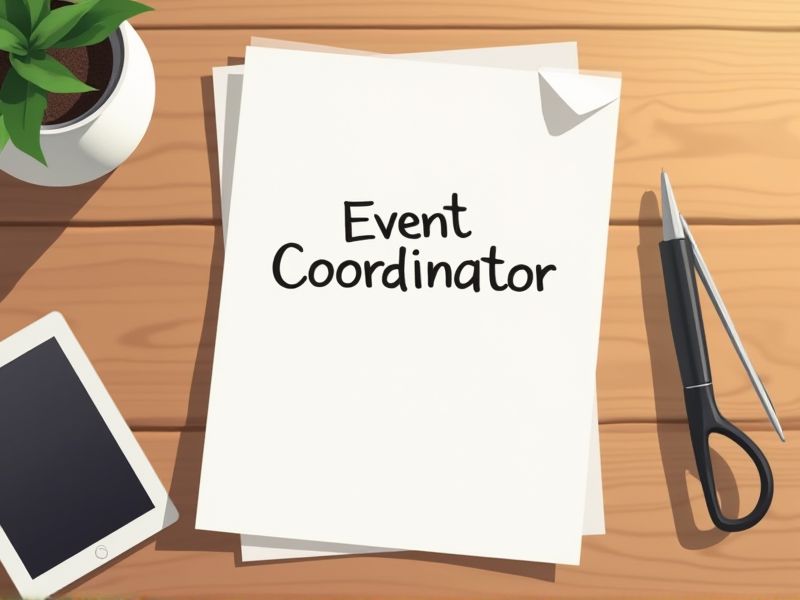
Event Coordinators deal with complex logistics, requiring skills that certifications can validate. Certifications not only enhance credibility but also signify a mastery of specific industry knowledge and best practices. These credentials facilitate better risk management, efficient resource allocation, and effective team coordination. Here are some vital certifications an Event Coordinator should consider acquiring.
Certified Meeting Professional (CMP)
Obtaining the Certified Meeting Professional (CMP) designation enhances an event coordinator's credibility, as it signals a recognized standard of expertise in the meeting and event industry. With CMP certification, coordinators often experience improved career opportunities, as employers and clients tend to prefer verified competencies. The CMP program equips professionals with advanced skills in event management, resulting in more efficiently planned and executed events. Certification also keeps coordinators updated on industry trends and best practices, encouraging continuous professional development.
Certified Special Events Professional (CSEP)
Certified Special Events Professional (CSEP) certification provides event coordinators with a recognized standard of expertise, ensuring proficiency in event management practices. Employers often prefer CSEP-certified coordinators due to the assurance of quality and competence in handling complex event logistics. Certification enhances an event coordinator's credibility, leading to increased trust from clients seeking specialized and professional service. Holding a CSEP can lead to career advancement opportunities and higher earning potential within the event planning industry.
Certified Government Meeting Professional (CGMP)
A Certified Government Meeting Professional (CGMP) designation equips an event coordinator with specialized knowledge of government protocols and regulations, essential for managing official events. It enhances credibility and trust, allowing coordinators to effectively liaise with government agencies and adhere to specific compliance requirements. The certification often leads to more opportunities, as government contracts frequently prefer professionals who comprehend the intricacies of public sector events. The training encompassed in CGMP ensures coordinators are proficient in budget management and logistical planning within the framework of governmental policies.
Certified in Convention Services Management (CCSM)
Obtaining a Certified in Convention Services Management (CCSM) credential equips an event coordinator with advanced skills in managing complex logistics, which results in smoother event executions. Possessing the certification often contributes to increased credibility and trust among clients and vendors, impacting overall customer satisfaction positively. The structured knowledge gained through CCSM enhances an event coordinator's ability to anticipate potential challenges, reducing the likelihood of last-minute disruptions. Industry recognition of this certification frequently correlates with more career advancement opportunities and higher salary prospects in the event management sector.
Certified Trade Show Marketer (CTSM)
Possessing a Certified Trade Show Marketer (CTSM) credential equips an event coordinator with specialized knowledge in trade show strategy, ensuring they can effectively manage and execute successful events. Training for the CTSM provides a clear understanding of metrics-based evaluation, enabling coordinators to measure event success and refine strategies. With a CTSM, coordinators gain enhanced skills in budgeting and resource allocation, optimizing cost-efficiency for stakeholder satisfaction. Certification also bolsters credibility and trust with clients, giving coordinators a competitive edge in a crowded market.
Event Management Certificate (EMC)
The Event Management Certificate (EMC) provides comprehensive knowledge of logistics, budgeting, and planning processes crucial for effective event coordination. As events grow in complexity, employers often prefer coordinators with a formal credential that demonstrates expertise and commitment to professional standards. EMC holders gain access to a network of industry professionals and resources, enhancing their ability to execute successful events. Data shows that event coordinators with certifications often achieve faster career advancement and higher earning potential.
Meeting and Convention Planning Certification (MCPC)
Event coordinators equipped with a Meeting and Convention Planning Certification (MCPC) possess a comprehensive understanding of industry standards, leading to more efficient event execution. Certification programs often include current trends and best practices, ensuring coordinators remain competitive and innovative in the evolving event landscape. Clients and employers are more likely to trust and hire certified professionals, evidencing a tangible impact on career advancement and credibility. The knowledge acquired through certification can directly translate to reducing errors and enhancing the overall attendee experience during events.
Project Management Professional (PMP)
Gaining PMP certification strengthens an event coordinator's ability to manage complex projects efficiently, ensuring that all components of an event are completed on time and within budget. It provides the technical skills necessary to plan, execute, and close projects systematically, reducing risks and improving stakeholder satisfaction. The structured approach learned through PMP helps event coordinators handle unexpected challenges more effectively, minimizing disruptions and ensuring seamless event delivery. Employers often prioritize candidates with PMP certification, recognizing the value of their specialized knowledge in improving project outcomes.
Digital Event Strategist (DES)
Event Coordinators benefit from a Digital Event Strategist because digital events demand different technological expertise than physical events. Increased reliance on virtual platforms requires a strategic approach to enhance attendee engagement and experience. An effective DES optimizes data analytics to refine future event strategies and outcomes. As the digital realm continues to evolve, events with sophisticated online components demand specialized skills not typically covered by traditional coordination roles.
Social Media Marketing Certification
Event Coordinators leverage social media to boost event visibility and engagement, and certification can enhance their skills. Certification provides in-depth knowledge of the latest social media tools and trends, ensuring strategies are current and effective. Employers often seek certified professionals due to their proven expertise, increasing job prospects and credibility. Data shows that certified marketers can achieve higher ROI, aligning event goals with measurable outcomes.
Summary
By obtaining certifications, you enhance your credibility and stand out in the competitive field of event coordination. This credentialing often leads to increased trust from clients and employers. As a result, you might experience more opportunities and potentially command higher fees or salaries. Your expanded knowledge can also improve event quality, boosting client satisfaction and referrals.
